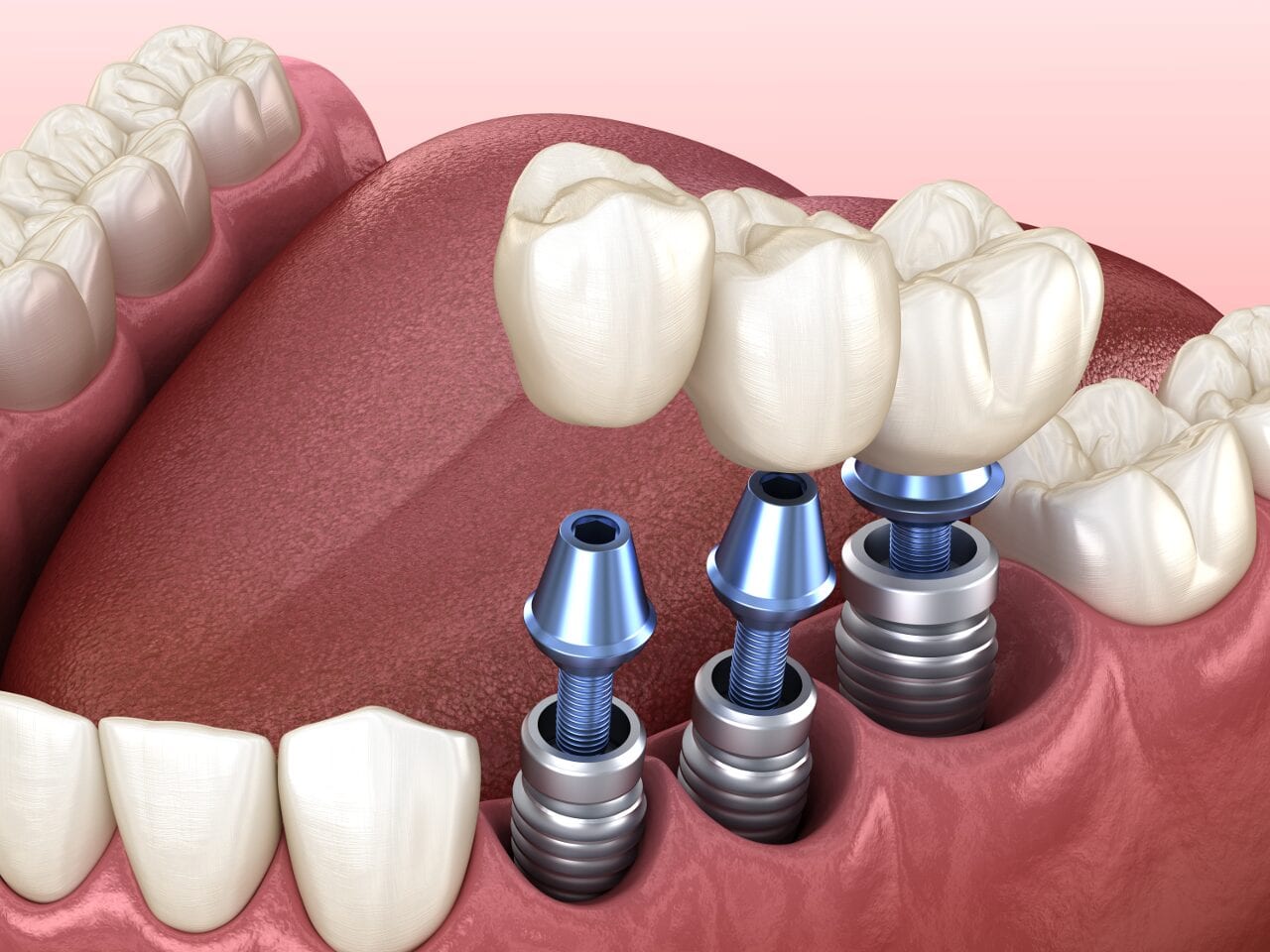Attractive, natural-looking teeth help us look and feel our best. They let us enjoy the foods we love and allow us to be naturally confident. People lose their teeth for many reasons, sometimes due to an accident, illness, or they are simply inherited. Whatever the reasons, missing teeth will have a negative impact on one’s quality of life. Fortunately, dental implant treatments allow restoration of missing teeth to a more permanent, natural form, fit and function.
What Is A Dental Implant?
Dental implant is a titanium screw that is firmly anchored within the jawbone, onto which a crown or a bridge is fabricated. Dental implants serve as artificial roots. One or more implants can be fitted in the upper and or lower jaw. Dental implant treatments offer considerable stability and retention as compared to other traditional method of replacing teeth.
Dental Crowns and bridges are replacement teeth that are individually designed to look and feel like your natural teeth.

What Are The Steps Of Having A Dental Implant Fitted?
On your first appointment, you will have a consultation with our implant ologist, who will determine the treatment plan that is suitable for you. This plan will consider your general health, jawbone density/mass, and position/orientation for the implant(s). In some patients a bone augmentation procedure known as bone grafts may be necessary to prepare the target area for the implant.
Once the implant site is ready, we will drill the implant inside the jawbone and through the gum; the implant is left for a period to give surrounding tissue the ability to heal. By doing so, a union will form between living tissue and the implant in a process known as osseointegration.
As a last step, a crown or a denture is fitted over the implant that resembles your natural teeth.
What Are The Benefits Of Having A dental Implant?
Dental implants are very stable inside the mouth, they offer the patients more retention and durability thus they are considered to be a long life investment when compared to other conventional methods of replacing teeth.
Am I Eligible To Have A Dental Implant?
Your dentist will need to ask you about your general health, ask for further lab investigations if you have any existing medical conditions. Most of the patients are however eligible to have dental implants.
How Can I Maintain Dental Implants Inside My Mouth?
In general, maintaining good oral hygiene of your mouth is necessary. You need to brush your teeth at least twice a day, use dental floss to clean between your teeth and finally use an antibacterial mouth wash to help keep your mouth clean. Leaving any food debris and bacteria to accumulate around your implant tooth will lead to inflammation that can cause the failure of the implant if neglected. Therefor to preserve your dental implant, a thorough cleaning regime needs to be followed and a special suitable plastic instrument will be recommended by your dentist to clean around your implant tooth.
Why You Should Not Ignore Missing Teeth?
Missing teeth can create oral health conditions that could affect the health and function of remaining teeth. Missing teeth affect the positioning of your other healthy teeth, causing a misfit of the upper and lower jaw, causing stiffness in the muscles and joints contributing to migraines. Often, restoring missing teeth provides relief of these symptoms
Missing teeth can cause a loss in bone density because the bone is no longer stimulated when chewing. Over time, the jaw line changes and shrinks making one look older. If you ware dentures, you may experience problems with an insecure fit, or embarrassing situations and pain. Implants are a good option because they act like your own natural tooth roots. They can support dental crowns that look and feel like real teeth.
References:
Estrela, C., Holland, R., de Araújo Estrela, C. R., Alencar, A. H. G., Sousa-Neto, M. D., & Pécora, J. D. (2014). Characterization of successful root canal treatment. Brazilian Dental Journal. https://doi.org/10.1590/0103-6440201302356
Sjögren, U., Hägglund, B., Sundqvist, G., & Wing, K. (1990). Factors affecting the long-term results of endodontic treatment. Journal of Endodontics. https://doi.org/10.1016/S0099-2399(07)80180-4
Why is visiting the dentist so important?
Visiting the dentist regularly will not only help keep your teeth and mouth healthy, but will also help keep the rest of your body healthy. Dental care is important because it:
- Helps prevent tooth decay
- Protects against periodontal (gum) disease, which can lead to tooth and bone loss
- Prevents bad breath – brushing, flossing, and seeing the dentist regularly will help reduce the amount of bacteria in your mouth that causes bad breath

